#jewish writers
Text
three romanian authors to read with ur dracula daily
dracula is an orientalist text conceived at the height of british empire, grounded in distortions of a region that stoker never visited. sadly (and unsurprisingly) i found very few romanian authors who have been translated into english online, so here’s a meagre list of recs:
1. luminița cioabă
romanian roma author, famous in romania as the daughter of bulibasha (the king of the roma nation), she forged her own path as a writer of short stories in the oral roma tradition which portray in vivid detail the history of the roma people of romania
the birch grove
queen of the night and stone flower
meralda
from her book, the lost country
2. marin sorescu
from humble rural romanian roots, he wrote under the oppressive ceausescu government. in a national ironic tradition he very famously said: "Just as I can't give up smoking because I don't smoke, I can't give up writing because I have no talent." some of my favorite poems:
the sea shell (1983)
carbon paper (1980)
creation (1992)
3. paul celan
jewish poet from bucovina. i recommend this beautiful essay by ilya kaminsky, who like celan was forced to flee eastern europe due to antisemitism, deconstructing various translators’ attempts to adapt celan’s texts and experience of the holocaust. these are all poems from a 1971 poetry collection
all souls
leap-centuries
language mesh and night
homecoming
#dracula daily#dracula#romanian lit#romania#romanian literature#romanian#romanian writers#romani writers#jewish writers#bookblr#recs#please feel free to add if you have any other translation recs
13K notes
·
View notes
Text
JTA and Andrew Lapin
Almost as soon as the piece appeared online, it began drawing criticism from within the Guernica staff. Founded in 2004 partly in response to the Iraq War and named after Pablo Picasso's famous anti-war painting, the nonprofit magazine has long married literary bona fides and left-wing politics.
Joshua Gutterman Tranen, an anti-Zionist Jewish writer who has published in Guernica in the past, specifically pointed out a passage he found objectionable in which Chen briefly pauses her volunteer work after October 7, writing, "How could I continue after Hamas had massacred and kidnapped so many civilians, including Road to Recovery members, such as Vivian Silver, a longtime Canadian peace activist? And I have to admit, I was afraid for my own life."
"The moment in the Guernica essay where the Israeli writer – who never considers why Palestinian children don't have access to adequate healthcare b/c of colonization and apartheid – says she has to stop assisting them getting medical support because of 'Hamas,'" Tranen tweeted. "This is genocidal."
Chen's essay is not the first time progressive Jews and Israelis have been condemned for being insufficiently critical of Israel. The official movement to boycott Israel, for example, called for a boycott of Standing Together, an Israeli-Palestinian coexistence group that opposes the war, saying that the group promotes "normalization" of Israel. And when Haymarket Books, a left-wing publisher, recently announced a book co-authored by longtime leaders of the anti-Zionist group Jewish Voice for Peace, it drew sharp criticism on Instagram – in part because one author, who supports boycotting Israel, is married to an Israeli and has family members in Israel.
For some Jews who have questioned their place in progressive and literary spaces since October 7, Guernica's retraction offered new evidence of a toxic discourse in which no Israeli or Jew can pass muster.
"THIS is what was beyond the pale? This essay of nuance, lived experiences, fears, hopes, and continuing to strive in her own way for peace?" tweeted Sara Yael Hirschhorn, a historian of modern Israel who has written about her own struggle to sustain her liberal Zionist outlook after the attack, after reading the retracted piece. "Obviously this is just a bigoted decision about an Israeli and Jewish author … This virtual burning of books is bareknuckled antisemitism."
Emily Fox Kaplan, a Jewish writer who had shared the essay before it was retracted, wrote that she saw the criticism of Chen's essay as part of a much wider dynamic.
"The problem, when it really comes down to it, is that it presents an Israeli as human," she tweeted. "The people who are losing their minds about this want to believe that there are no civilians in Israel. They want a simple good guys/bad guys binary, and this creates cognitive dissonance."
Some non-Jewish writers also lamented the piece's retraction.
Matt Gallagher, a war correspondent who is also a veteran and who opposes the Israel-Hamas war, said his own work had benefited from reading thoughtful authors whose perspectives were different from his own.
"If you want the war in Gaza to end, as I do," he tweeted, "shouting down calm Israeli voices mulling the ruin of it all isn't going to help."
#guernica#guernica magazine#progressive jews#joanna chen#israel#hamas#gaza#jews#jewish writers#boycott#antisemitism#israelis as human
42 notes
·
View notes
Text
Marc and Bella Chagall – Legend and Love

Marc Chagall (Russian, 1887-1885) • Bella with White Collar • 1917

Bella Rosenfeld Chagall (1895-1944)
Marc Chagall's wife and muse, Bella, was the subject of many of the artist’s paintings. They met in the Russian-Jewish village in Belarus where they both grew up and fell in love at first sight.
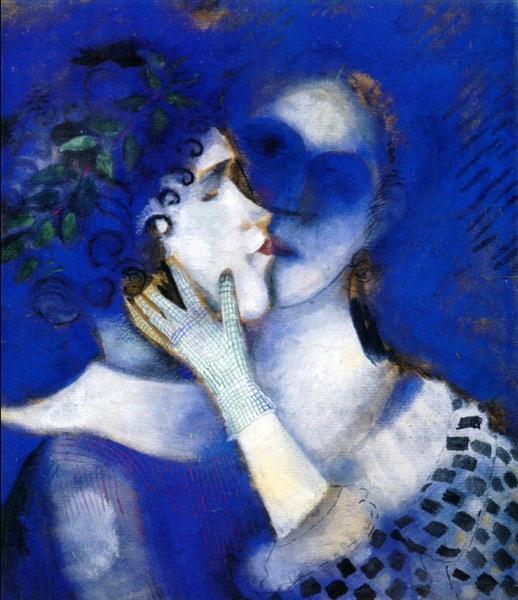
The Blue Lovers • 1914
Bella Rosenfeld was a talented writer. Her memoirs were written between 1939 and her death in 1944. Written in Yiddish, they tell the stories of Bella's experiences growing up in a small village in Belarus, from early childhood and adolescence and her early relationship with Chagall.
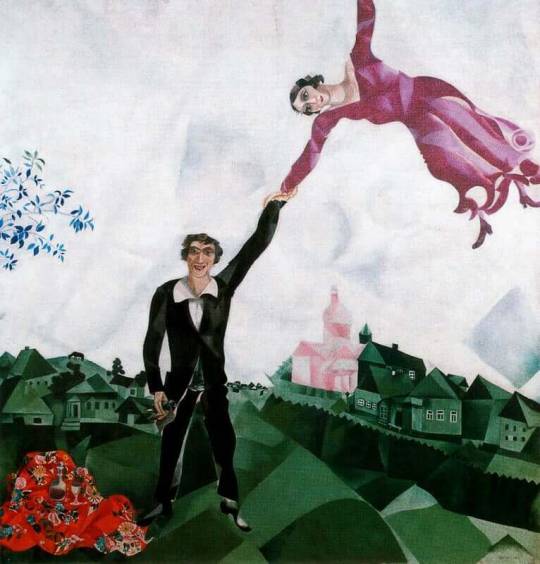
The Promenade • 1917
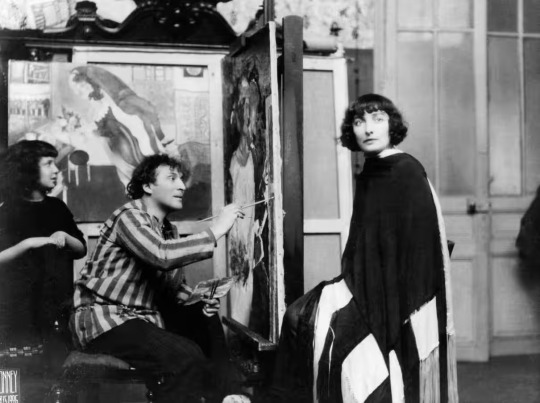
Marc, Bella, and their daughter Ida in his Paris studio • c. 1924
After her death Chagall and Bella's only child, Ida, worked together to collect and edit Bella's writings and publish them as books. Ida translated the text from Yiddish to French and Chagall created 32 illustrations and an afterword. Burning Lights was published in 1946. The second volume, The First Encounter was published the following year.

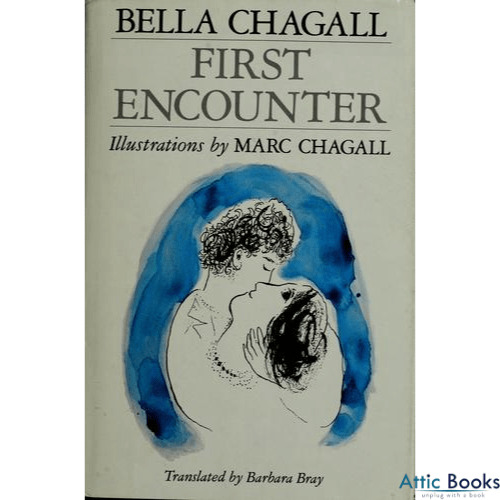
“When you did catch a glimpse of his eyes, they were as blue as if they’d fallen straight out of the sky. They were strange eyes … long, almond-shaped … and each seemed to sail along by itself, like a little boat.” – Bella Chagall, The First Encounter
Sources:
marcchagall.net
commentary.org
Internet Archives: Full text of Burning Light
European Literature Network: A review of Burning Lights and First Encounter by Mika Provata-Carlone
Yiddish Book Center
Wikipedia entry for Bella Rosenfeld
#art#painting#fine art#marc chagall#bella rosenfeld#artist muse#jewish heritage#memoirs#the burning lights#the first encounter#chagall illustrations#ida chagall#paris#belarus#russian artist#jewish artist#20th century european art#jewish writers#pagan sphinx art blog#writings on art
33 notes
·
View notes
Text
(Setting the scene- a group of Jewish kids are going across the city on public transport to get milkshakes after dinner at a rabbi’s house)
“Are you sure you have directions, Hao?” I ask through chattered teeth because as long as my shabbos skirt is, it’s not enough to protect me from the surprise cold of March.
“He’s never sure.” Josh snorts, folding his arms tight against each other to look cool. He then yelps, when Hao nearly slaps his arm off its joint.
“Uh huh, uh huh,” Hao nods, fiddling with the transportation app after asserting dominance in the previous moment. “We either switch stops three times or we stay on the one train. The difference is four minutes.”
“Okay never mind,” I quickly interrupt. “I don’t trust you. Let’s just stick on the one train.”
Avigal and I share a look as Josh and Hao argue over the best way as to get to the random podunk place they swear up and down they’d been to years ago. The arrival time flashes up on the glitching screen- it’s due.
“Well it’s going to be here in a minute,” Avigal interrupts the boys, reaching for her public transport card. “We should get on the platform-“
“Wait, wait, wait,” Hao holds up his hands. “We’re forgetting something.” He gestures around us. “Let’s not get hatecrimed tonight, y’all? Come on, i’m expecting some communal effort.”
Simultaneously, we all zip up our jackets all the way to our chins, obscuring our Magen Davids, Chai pendants, hostage awareness dog tags- and in Josh’s case- all three. He grumbles when we tease him he’s an ADL case on legs.
And then we hear the train coming down the tracks, and start sprinting off up the stairs, into the rest of our holy day.
#word for word what happened last Friday#fromgoy2joy thoughts#jumblr#jewish#jewish convert#jewblr#jewish tumblr#jewish conversion#jewish humor#tw antisemtism#antisemitism#jewish writers#dark jewish humor#jewishness
52 notes
·
View notes
Text
All Vows Chapter 28: It Would Have Been Enough

"If she had never returned to him, but had lived a happy life, it would have been enough.
If she had returned to him, and only asked him to help her learn to sing again, it would have been enough.
If she had entrusted him with her voice, but never called him her friend, it would have been enough."
All Vows Chapter 28 is now on AO3
12 notes
·
View notes
Text
Trauma & Accountability Regarding Zionism, Israel & Palestine
by Michele Sommerstein
Generally speaking, when a person from an oppressed demographic expresses their feelings about their past and/or present persecution, be it social and/or systemic and the trauma that can ensue, it is unethical for those who are not experiencing said trauma, to police their tone in the name of one's own comfort.
At the same time, there are situations where there needs to be a certain level of accountability on the part of the trauma survivor.
For example, let's say as a woman, I am out one night, and due to no fault of my own, I am robbed at gunpoint. Since that event, traveling at night now triggers (in the psychological sense of the word, not just merely bothered as it's often misused) and brings me back to that moment of violence. In response, and not by choice, my body goes into fight or flight mode (which I am not aware of) and I feel desperately unsafe all over again. So, in the name of feeling any semblance of security, I start to have thoughts of how I "must" attack people around me, “before they can attack me”. A thought rooted in trauma that in time I have started to physically act upon. In reality, no one in these moments is attacking me nor has the intention to do so, but one's perception can be skewed during a trauma response.
And so in this case, while my trauma explains my behavior, it does not justify it. In that moment, we can truthfully say that I am simultaneously a victim of past violence and a perpetrator of such. One can be both for while present actions do not negate the existence of my past, my past does not negate nor excuse the immorality of my present actions.
But if you were to point out how unethical my behavior is, especially during a trauma response, and particularly without first acknowledging my trauma, though factual, this in itself would be triggering. "How could you say that? I am a victim!" I might say. Because in my mind, I "need" to attack these people for otherwise I will "never be safe". That's not actually true, but that is what I believe to be true, for when one has a trauma response, it can be difficult to separate what happened in the past from what is happening in the present.
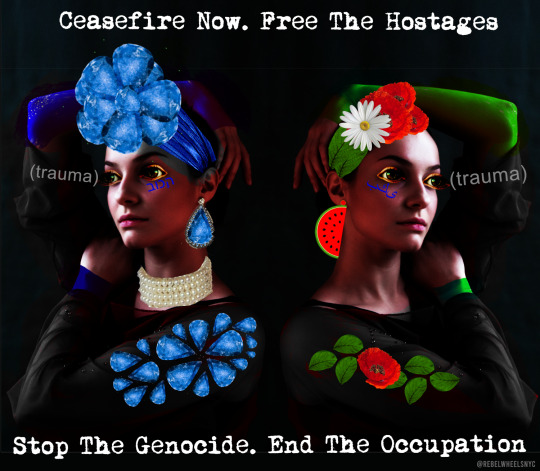
[image description: An artsy collage with a black background. Two women standing near each other but their backs are turned to each other.. They have the same pose where one arm is bent so the hand is resting on the shoulder and the other arm is bent so the hand is behind the head. The woman on the left represents Israel & the woman on the right represents Palestine. While they are both wearing a black top to represent mourning, they are wearing accessories that represent the colors of their flag. On the left the woman representing Israel has a lot of large blue gems that decorate her shirt, earrings, and headband (to show the power and wealth of Israel). She wears a white pearl choker necklace. the word "trauma" in a semi-faded white is by her eyes. The woman on the right (Palestine) is wearing the same black top, but her decorations are more simple. red and white flowers, with green leaves. She wears watermelon earrings (a symbol of Palestine's liberation) The word trauma is also near her eye. The top text: ceasefire now. free the hostages. bottom text: stop the genocide. end the occupation]
Now, let's apply that to the topic of Israel, Zionism, and Palestine.
RELATED: "Countdown to genocide: the year before October 7" a timeline from Jewish Voices For Peace
Obviously, the logistics are far more complicated than the previous example. While it is true that antisemitism thankfully no longer occurs at the level that it has in the past, it certainly still exists. But the example remains applicable because while trauma explains what is happening, or at least partially, it does not justify it.
Ideally, people who have survived trauma would be empathetic to others who have also experienced such things. And yes, sometimes going through trauma can make you more compassionate to other survivors, but sometimes it can lead to one becoming hyper-self-preservational.
That said, some might find it odd that Zionists (more than not) do not see the similarities in the trauma that both Jews and Palestinians have experienced. For example, both Jews and Palestinians have experienced violent Pogroms. Many Zionist Jews do not view Palestinians as full-fledged humans, but rather as animals, just as the Jewish people were viewed in The Holocaust, which was then used to justify their oppression. (It's not okay to oppress actual animals either, but that's another article.)
How can Zionists not see the similarities in what Jewish and Palestinian people have endured? Perhaps at their core, they do, but Zionists go to such great lengths in their minds to justify the persecution of Palestinians, because they're convinced that without the state of Israel, "they will never be safe".
youtube
[image description: Video thumbnail from AJ+. Image of a Palestinian artist and the illustration of a slice of watermelon, a symbol of Palestinian resistance.]
But what makes it even more complicated is that many powers of the world, benefit from the Jewish People not healing. They are so quick to weaponize our trauma and grief literally and otherwise (going way before October 8th.)
[image description: Video thumbnail. Brown background with a centered video still from C-SPAN of a much younger Joe Biden. The white text on top reveals what's the real reason behind the US supporting Israel]
And then there is Zionism which does not benefit from the collective healing. Remember the holocaust?! Remember these horrific events? Perpetually poking the wound by bringing up these moments and then insisting we (the Jewish people) will never be safe unless we have Zionism and The State of Israel. Zionism needs us to never fully relax. Zionism needs us to need Zionism.
However, one could factually state that despite their supposed goal of safety, Zionism has not taken many constructive actions that would work towards this.
Now. before we delve a bit deeper into this point, the following should be noted:
1.) When they say Zionism speaks of a Jewish state and keeping The Jewish people safe, really what they mean is Zionist Jews. Not all Jews are Zionists and The Zionist movement isn't fond of the ones who are not.
youtube
[image description: Video thumbnail from the movie Tantura. Film by Alon Schwartz. The background is an image of a map in a very faded yellow with the image of an Israeli soldier on top. Covering the soldier's eyes and mouth are two horizontal blue stripes representing the stripes of the flag of Israel. To the left are short reviews of the film.]
And 2.) Yes, it is true that some people do use the topic of Israel, Zionism, and Palestine as an excuse to be antisemitic, which must always be called out (just as it must be called out when people use the topic as an excuse to be Islamophobic),
That said, one can validly speak out against Israel's violent policies without being antisemitic. Despite the great lengths Zionism goes to falsely equate even valid criticism of Israel with being antisemitic, there is a difference between being antisemitic and anti-Zionist.
That said Zionism can not factually say that Jews will never be safe without Zionism or Israel. Besides the fact that consequences exist (see October 8th, 2023), it is also impossible for any group to oppress their way to safety. It is also immensely and grossly unethical to do so.
And yet Zionism continues to dangerously provide Zionist Jews with very different information than what the rest of the world has access to. They falsely claim that people hate them and are against Israel, not because of unjust policies, but because they want Jews to never be safe and free.
This is not true, but because Zionism tells Zionist Jews that The Jewish people can never be free without Israel, it creates this multi-layered trauma-induced desperation that results in the support of violent policies, which then creates a greater risk of violent consequences, which highly works against the so-called goal of safety.
youtube
[image description: Video thumbnail from AJ Plus. It is a screenshot split in half showing on one side a Jewish settler debating with a Palestinian woman on the ethicality of land theft in Palestine.
At the end of the day, nothing should be beyond valid critique, and certainly not something as powerful as Israel. And the way Zionism works to silence even valid criticism is dangerous because to do so is unethical and a red flag, but it also waters down the impact & validity when something is labeled as antisemitic. Now when the word is used, people have to question: did you mean actual antisemitism or just anti-Zionism? And how many people are not even bothering to ask and are automatically assuming that even valid claims of antisemitism are false? This is not what safety looks like.
youtube
[image description: Video thumbnail from AJ Plus. In the center is a journalist. In the background are two images one of the murdered journalist Shireen Abu Akleh and one of an Israeli politician.]
And If Israel has to go to such great lengths to censor and suppress valid criticism of their actions, if they need to intentionally misinform their supporters then what does that say about their actions and the Zionist movement? It also begs the question, what else is Israel claiming to be true, but is not?
Related: Take Action! Demand A Ceasefire Now!
youtube
[image description: Video thumbnail of an Irish politician speaking to the Irish government about the topic of Israel and Palestine.]
To be clear, I am in no way negating the trauma of October 8th, when Hamas attacked people attending a music festival in Israel. The attack was validly traumatic and unethical. But if we are factually labeling the event unjust and traumatic, then we must also use these labels regarding what the Palestinians have been and continue to experience due to policies from the Israeli government.
youtube
(Israel often says that we must free Palestine from Hamas, but it was not Hamas who created the Nakba. It was not Hamas who turned Gaza into what is essentially an open-air prison. ) [image description: Video thumbnail from AJ +. Image of a city with many buildings and a large prison gate behind it. The text reads how Israel made Gaza the world's biggest prison]
And while the trauma of the past explains the behavior of Israel, (or at least partially so, for can we factually say that the policies of the Far Right government of Israel are solely rooted in trauma?) it will never justify what they are doing to the people of Palestine.
youtube
[image description: Video thumbnail from AJ +. In the background is a faded photo of an old city, I assume Palestine. On the left is a Palestinian flag, in the center is a yellow illustration of the shape of Gaza, and to the right is the flag of Israel]
Israel continues to claim that the Jewish people will never be safe unless we have the state of Israel.
And while Zionism has yet to provide this safety that it has been promising for decades, I have seen Jewish-led activist groups such as Jewish Voices for Peace, and Jews for Racial & Economic Justice (among others) who do not isolate themselves from other marginalized groups, creating solidarity and community.
Jewish-led groups who knows that the powers that be strive and benefit from pitting Jews against Palestinians, and refuse to fall into their trap.
Who unapologetically decries the persecution of Palestinians and is clear and loud when they say #NotInOurName
Who knows that isolating ourselves will not only fail to keep us safe but also does not honor the fact that many marginalized identities intersect with the Jewish identity.
Who knows that “the people united will never be defeated” is not just a meaningless chant you hear at protests, but that all marginalized people are safer and stronger when we stand & unite together. This is what safety looks like.
And lastly Jewish-led groups who are letting the world know that despite the trauma, groups who honor the trauma, who are mindful of the trauma, who refuse to let the fear from the trauma, cause more pain to others as well as ourselves while failing to keep us all safe.
youtube
[image description: a video thumbnail showing a massive crowd, including Jews and allies, protesting in Grand Central Terminal in New York City in support of a ceasefire]
#Jewish#Jewish writers#disabled writer#queer writers#Israel#Palestine#Judaism#ceasefire now#Gaza#trauma#accountability#Zionism#let Gaza live#free Palestine#Jews for ceasefire#Jews for Palestine#permanent ceasefire#end the occupation
10 notes
·
View notes
Note
personally i think there’s a difference between being a zionist who supports the palestinian genocide and a zionist who believes in a perfect world, we could easily have a two state solution or somewhat…
did i word this correctly? i do not want genocide but it would be nice if there could be a jewish homeland, however i believe it would hurt and destroy too many things to make it happen now. i’m not sure what i believe whether i am “anti zionist” or a pacifist zionist yet i don’t believe being a pacifist could be available in this situation. we are too far past it feels.
i think it's kinda a jewish rite of passage to have indescribably complex and conflicting feelings about zion and/or eretz israel
ngl this is why i'm so vocal about the diversity of zionisms bc you are absolutely not alone in this wrestling
this very much parallels a lot of the wrestling i'm going through rn. my rabbi sent me a reading list of books that address zionism in a less. genocidey, licking the israeli gov's boots way lmfao here lemme attach it. i haven't gotten time to look into any of them (this just in: finals are antisemitic!!!) but i trust my rabbis judgement sm
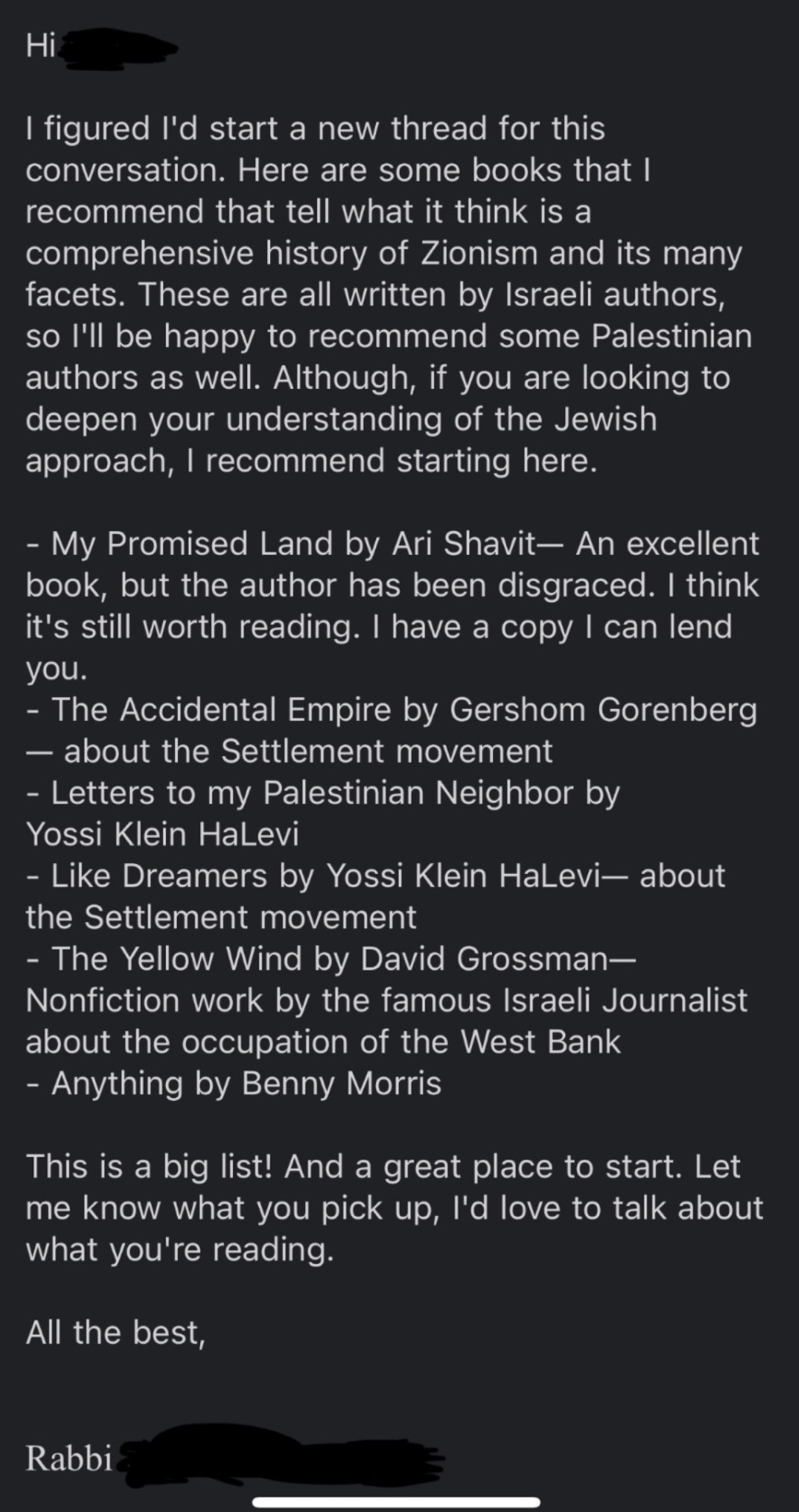
anon please feel free to continue reaching out, i think this is a thing a lot of people a lot of people with dealing with, and nothing's more jewish than wrestling with an impossible question together
#zionism definition#jumblr#jewish wrestling#jewish writers#jewish history#asks#anonymous#tsiyyonus definition
13 notes
·
View notes
Text
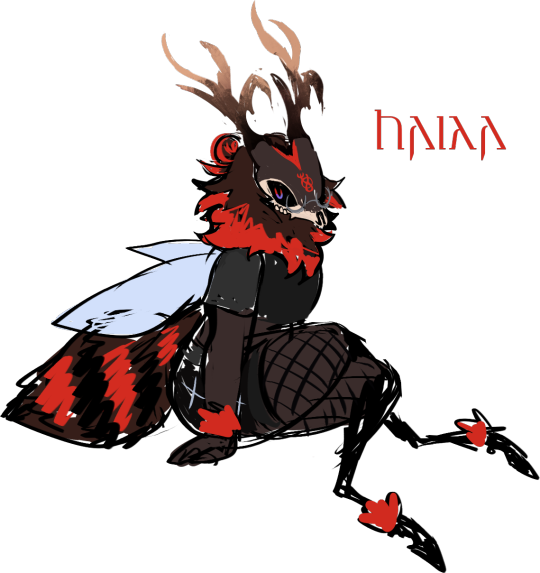
ꙮ he/him/she/her ꙮ
~ Writing Commission Rates ~
SFW - 10-25¢ per word
NSFW - 25-50¢ per word
~ Genres ~
Fantasy [Dark, High, Low, Grimdark]
Science Fiction
Science Fantasy
Historical Fiction
Slice of Life
Fanfiction [Fandom Dependent]
Self Insert
~ Aesthetic Influences ~
Fear and Hunger
Dragon Age
Mass Effect
Warhammer 40,000
Age of Sigmar
The 9th Age
KOTOR II The Sith Lords
Elden Ring
Salt and Sanctuary
~ Contact ~
This blog
[email protected]
~ Writing Examples ~
ꙮ COMMISSIONS OPEN ꙮ
#writing commissions#queer writers#science fiction#science fantasy#grimdark#fear and hunger#dragon age#mass effect#warhammer 40k#age of sigmar#the 9th age#kotor#swtor#starwars#writing comms open#writer#jewish writers#bigender#open commissions#writing#fanfic#creative writing#gothic#salt and sanctuary
8 notes
·
View notes
Text
Hortense Calisher
Hortense Calisher was born in New York City in 1911. Though Calisher did not publish her first novel until she was 50, she was a prolific writer with a distinguished career, with a body of work including fifteen novels, three memoirs, and six short story collections. She was a three-time finalist for the National Book Award, and the recipient of a Lifetime Achievement Award from the National Endowment for the Arts. From 1986 until 1987, Calisher served as president of PEN American Center, and from 1987 to 1990, she was president of the American Academy and Institute of Arts and Letters.
Hortense Calisher died in 2009 at the age of 97.
5 notes
·
View notes
Text
Goyim DNI
#fanfiction#jewish!reader#jewish writers#jewish writer#jumblr#jewish tumblr#jewish representation#authentic representation#jewish characters
4 notes
·
View notes
Text
Jumblr!
I think about starting a weekly Parashah-related writing prompts (starting at Bereshit).
Is anyone interested?
Also, plz lmk if you'll be interested in joining a multifandom Jewish -writing related discord group?
(Or if one already exists?)
Lmk!
#jumblr#prompt#parashat hashavua#פרשת השבוע#Prompt of the Parashah#parompt#actually jewish#jews#jewish#jewish culture#jewish writers#writing prompt#writing#idea
11 notes
·
View notes
Text
In the midst of it all, Eidenberg seemed unable to decide his position. One minute he appeared pitying, the next unreadable, then frustrated.
One by one, speaker after speaker got up, blind, deaf, physically disabled, former addicts, parents of disabled, sharing thoughts, feelings, pain, isolation, anger, heartbreak, telling of years spent trying to get a job, an education, trying to count, trying to matter.
Suddenly Eidenberg abruptly stood up from the table, turned, and ran out the door.
I looked at the congressman. Everyone looked at each other, confused. What had just happened? Did Eidenberg really run out of the room?
Down the hallway, a door slammed.
Congressman Burton jumped up. Red in the face, he turned around and dashed out the door after Eidenberg.
"Get out of there! Come out of there right now! Get out of there!" We heard him yell, kicking the door.
Utter silence.
"Come out! Get out here right now!" Congressman Burton was livid.
Finally, we heard a door open.
Eidenberg walked back into the room, shadowed by Congressman Burton. He looked down, clearly avoiding our eyes. Ashamed.
Fists clenched, Congressman Burton walked behind him, escorting him back to his chair. He stood behind him and waited until Eidenberg had sat down again and then forced him to face us.
The hearing continued on. It was five hours of testimony.
You should all read Being Heumann by disability activist Judith Heumann, btw.
#jokes aside it is so fucking brilliant#disability pride#disability#disability history#disabled history#disabled pride#disabled writers#women's history#women writers#women's history month#disabled women#jewish writers
4 notes
·
View notes
Text
A brief intermission
Sometimes I have to pause while scheduling daily story posts/updates to massively rework a central scene—one of the first scenes written—written when the entire basic concept of the genre and story structure was utterly different. Like Fairly Odd Parents v. Rocky Horror Picture Show different. (Not that this is either!)
#the midrashist#magical realism#fiction#fairly oddparents#the fairly oddparents#dr frank n furter#frank n furter#rocky horror picture show#rocky horror show#rocky horror#writing update#writing#queer writers#trans writers#jewish writers#trans#genderqueer#Ḥemdeh
4 notes
·
View notes
Text
hiii im looking to connect with other jewish (and not) ppl who love to read and/or write, esp fantasy/sci fi!
im lefty on p much *every* issue so def looking for people who are similarly minded <3
10 notes
·
View notes
Text
#antisemitism#Jewish writers#tavi gevinson#naomi klein#tony kushner#hari nef#ilana glazer#abbi jacobson#emma straub#molly crabapple#hannah gold#and many more
3 notes
·
View notes
Text
"The Exchange"
Fantasy Flash-Fiction by Zohar Jasper
(994 Words)
A Jewish immigrant to Scotland avoids a fight with a local on the coast.
Contains LGBT themes/characters.
TW: Brief antisemitism in the beginning.

The rain was so muggy it made the blood on Aron’s face burn like ice. The stormy coastline swirled as his head pounded. With shaky eyes, the waves looked thirty feet tall. Sliding down the rocks, hitting his head once more on the way down, he kept towards the monstrous sea. G-d saw to it that he didn’t have much say in the matter.
Gritty pebbles poked his skin and lodged themselves deep into his curls and the fabric of his kippah. The shadows of an overhead cliff covered him as he lay there. Shattering waves deafened the cackles of his assailants up above. They hollered in their pursuit, but he was sheltered.
When Aron finally rose, the night had taken hold. The stars were as plentiful as the rocks stuck to his skin, glued by the dried blood. He winced as he glanced at the folded paper in his coat. This lone page permitted him to live here, despite the locals’ protests. The pouring rain hadn’t ruined it yet, but it’d never survive the trek home. The only thing he feared more than a goy was his angry wife.
Unable to bear the weight of the rain, some rocks tumbled down. Falling with them was a glitter like a shooting star. Delirious, he shoved the paper back into his coat and ran for the light. He had to abandon his waterlogged shoes, clambering over slick rocks and thick sand. Yet his eyes adjusted and the cold no longer ached, and the stars were bright when he reached the prize. Brushing his fingers over the thick and slippery seal skin, all concerns fled his mind.
A miracle! A beautiful waterproof miracle delivered right to him! Making haste, Aron took off his shirt to dry the inside, and then carefully wrapped his documents in the skin. All the rain made the blood run down his skin in red streams, but it was too dark to see anyhow. No one would notice as he ran home exposed, least of all his wife. He’d slip in, clean up, and she’d be none the wiser.
Yet his plan failed instantly. He stood and turned around, gasping so hard he sucked in rainwater. The end of a spear pushed against his chest.
“That’s mine.” The spear’s wielder warned, digging it deeper. “Best drop it.”
The wind stole Aron’s voice as he stared at the long-haired man before him. Only once he heard the thump of the skin hitting the ground did he sputter out in spotty Gaelic. “I had no intentions of stealing, I’m- I’m new here, not familiar with the hunting.”
The man cocked his head. “If I’m hunting anything, it’s not that. Hand it over.”
Cautiously, Aron bent down. The spear traveled with him. The skin felt heavier as he picked it up. He tried to unwrap it to retrieve his items, but the man would not tolerate it.
“Agh, you rolled it! What’d you do that for?!”
“I’m sorry!” His dread got the best of him, and he couldn’t let go of the skin. Years of pleading with Parliament down the drain! All to move to a place he didn’t know! To please a wife he never wanted! Whom he married to appease his mother, who died for his father, who never loved her anyway. This late-night misadventure would still be a miracle if he never went home. Yet he couldn’t give up. “If you’d please, I’d like to borrow it for the walk home. Join me. I can feed you for the trouble.”
“You want to take me home?” Aron had never heard a man sound so insulted before.
“Of course. The lady’s got lamb cooking.” That was a lie. He knew damn well there was no hot food waiting. All they had was wine. Yet given enough, he could entertain. Still, the man was not persuaded. At last, Aron scrambled to remove his kippah. “Or, here. Hold this hostage until I return your skin to you.”
That intrigued the man, and he swiped it away from Aron. The kippah may as well have been Aron’s skin. With the crisp night air hitting his scalp, he felt more naked than being without his shirt. Seeing the man inspect it, with long and strong fingers holding it up to the starlight, made Aron dizzy.
“You truly aren’t from around here.” The man finally replied, the corner of his lips breaking into a grin. “What is this?”
Aron shrugged, uneasy. Anything to get out of a second mugging would be grand. Yet with that spear still touching him, a twinge of anxious excitement filled him up. “It keeps me close to my G-d. Keeps me true to my word, including my word to not be a thief! I hope that’s not a problem.”
“So this deity of yours is watching you now? Seeing if you lie to me?”
“I like to think so, yes.”
“Keep your skin.” The man threw the kippah back at Aron. “If we’re bringing Gods into it, that makes it easy.”
He threw down the spear, closing the distance between them. He grabbed Aron by his curls, but it didn’t hurt. It was more of a firm tug, and within seconds the taste of salt was in his mouth, and his whole body was on fire. The dull numbness from the spear traveled down his body and out his feet until it rooted him in the sand. He never wanted to leave.
Leaving him breathless, the man spoke. “That’s three things you owe me now, lest we upset the higher powers. My skin, dinner, and a kiss. Three’s a good number of binds. I’ll wait here. What’s your name?”
His insides bubbled. If this was ‘nice’ for the locals, he was in over his head, yet he couldn’t stop. “Aron ben Yonatan. And yourself?”
“Dàibhidh. Now run, Aron. Sunrise is soon. I need it back by then. Until then, the night is ours.”
#zjasperwrites#writeblr#queer writers#jewish writers#fantasy#lgbt fantasy#flash fiction#writers on tumblr
2 notes
·
View notes